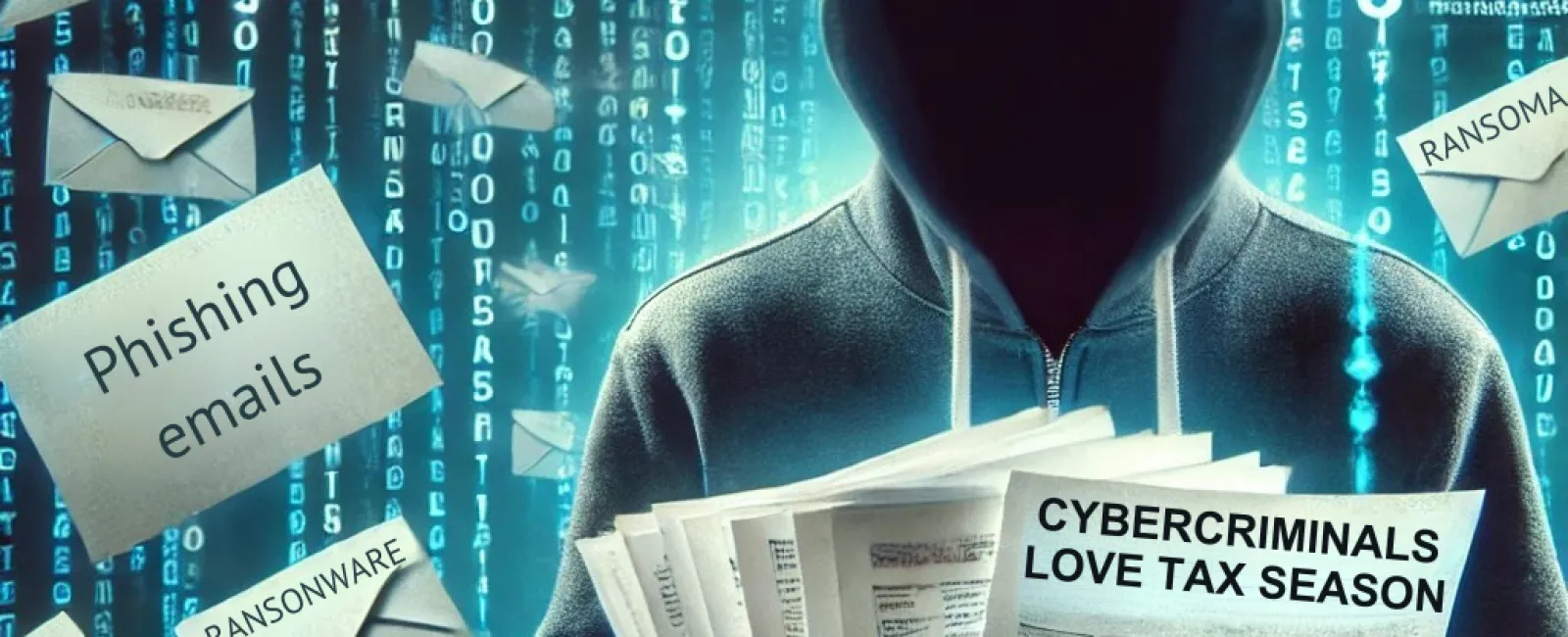March 10, 2025
Tax Season = Prime Time for Cybercriminals: How to Protect Your Business
Tax season is stressful enough—don't let hackers make it worse.
As businesses scramble to file returns, meet tight deadlines, and process financial documents, cybercriminals see an opportunity. They know you're busy. They know your inbox is full. And they know exactly how to exploit the chaos.
🚨 Tax scams are on the rise, and businesses are prime targets. 🚨
Let's break down why hackers love tax season—and more importantly, how to stop them.
Why Cybercriminals Love Tax Season
1. More Sensitive Data Flying Around
During tax season, businesses exchange a massive amount of financial and personal information—internally and with accountants, payroll providers, and tax agencies.
📌 More data transfers = more attack opportunities.
2. Tight Deadlines = Costly Mistakes
When employees are rushing to meet deadlines, they're less likely to double-check emails, links, or payment requests. That's exactly when phishing scams slip through the cracks.
📌 Hackers count on stress leading to mistakes.
3. Your Inbox is Full (And Hackers Know It)
Businesses get flooded with emails about tax forms, payments, and compliance updates. Cybercriminals spoof trusted contacts to sneak in fraudulent emails and steal login credentials.
📌 The higher the email volume, the easier it is to miss a scam.
4. Fake IRS & Tax Scams Are Everywhere
Hackers pose as the IRS, tax services, or even your accountant—all to trick you into sharing sensitive data or wiring money to fraudulent accounts.
📌 Pro tip: The IRS will NEVER email or call you for payment.
Tax Season Scams to Watch Out For
🚨 Phishing Emails - Fake messages from the IRS, payroll providers, or tax services asking for sensitive data or login credentials.
🚨 Fake Invoices & Payment Requests - Scammers impersonate vendors and send fraudulent invoices or wire transfer requests.
🚨 Ransomware Attacks - Hackers encrypt financial records and demand a ransom to unlock them.
🚨 Social Engineering Scams - Emails or phone calls from fake accountants or tax professionals trying to steal information.
🚨 Compromised Employee Accounts - If one employee falls for a phishing scam, hackers can infiltrate your entire financial system.
How to Protect Your Business This Tax Season
✅ 1. Train Your Team NOW
🔹 Teach employees how to spot phishing emails.
🔹 Verify senders before clicking links or opening attachments.
🔹 Question all "urgent" payment requests.
🔹 Report suspicious emails immediately.
✅ 2. Lock Down Your Communications
🔹 NEVER send sensitive tax data via email. Use encrypted file-sharing platforms instead.
🔹 Set up secure portals for sharing tax documents with accountants.
🔹 Disable auto-forwarding to prevent hackers from rerouting emails.
✅ 3. Enable Multi-Factor Authentication (MFA) Everywhere
🔹 MFA stops 99% of account takeovers.
🔹 Require MFA for financial systems, email accounts, and payroll platforms.
🔹 If your password gets compromised, MFA could save you.
🚨 Pro tip: If MFA is an option on ANY account, turn it on—now.
✅ 4. Conduct a Cybersecurity Audit
🔹 Check for security vulnerabilities BEFORE hackers find them.
🔹 Ensure all software and tax applications are fully patched and updated.
🔹 Secure employee devices & network endpoints.
🔹 Verify that your data backups are working—DON'T assume.
🚨 Pro tip: If you haven't had an IT security check in the last 6 months, you're overdue.
✅ 5. Always Verify Financial Requests
🔹 Confirm payment requests using a second communication method (like a phone call).
🔹 NEVER trust an unexpected email requesting payment.
🔹 Double-check bank details before making transfers.
🚨 Pro tip: Scammers often change just ONE digit in an account number or email—look carefully.
Don't Let Hackers Cash in on Your Business
Tax season should be about filing returns—not filing cybersecurity incident reports.
By staying vigilant, educating your team, and implementing proactive security measures, you can stop cybercriminals before they strike.
📢 Get a FREE Network Assessment to check for security vulnerabilities before hackers find them.
📅 Book Your FREE Cybersecurity Risk Assessment Now
📞 Or call us at (866) 771-7348
Let's make sure your only tax season headache is paperwork—not a cyberattack.

